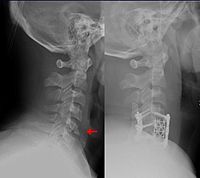
Photo from wikipedia
Background Rheumatoid arthritis (RA) is a chronic, systemic inflammatory disorder, precipitating chronic inflammation of the joints, and also affects organs throughout the body, and even results in joint deterioration/disability. RA-related… Click to show full abstract
Background Rheumatoid arthritis (RA) is a chronic, systemic inflammatory disorder, precipitating chronic inflammation of the joints, and also affects organs throughout the body, and even results in joint deterioration/disability. RA-related inflammation that is responsible for synovial lesions may be implicated in the development of accelerated atherosclerosis, leading to increased risk of cardiovascular disease (CVD), and increased mortality. Objectives This study aimed at examining changes in the risk of deaths, CVD and RA-related orthopedic surgeries between the patients treated with conventional synthetic and biologic disease modifying antirheumatic drugs (csDMARD and bDMARD) for RA during 1997–2011. Methods Two cohorts of severe RA patients and their matched controls were identified from National Health Insurance claims database. The csDMARD cohort was patients who had medication claim for cyclosporine ≥50 mg/day with concomitant use of ≥2 csDMARDs for ≥28 days within 56 days after cyclosporine use during 1997–2003 (N=1,569). After csDMARD cohort was determined, the bDMARD cohort was selected if patients had ≥1 claim for bDMARD during 2003–2011 (N=1,530). Adjusted hazard ratios (aHRs) for the risk of death, myocardial infarction (MI), stroke, and RA-related orthopedic surgeries were assessed between the two cohorts and their controls, respectively, using Kaplan-Meier survival curves and Cox proportional hazards models. Results RA patients using bDMARD showed a markedly decreased risk of death (aHR:1.05; 95% CIs=0.84–1.33) compared with RA patients using csDMARD (aHR:8.75; CIs=7.43–10.31). Also, bDMARD was associated with a reduced risk of stroke (aHR:0.37; CIs=0.22–0.62) compared with csDMARD (aHR:0.73; CIs=0.51–1.05). For RA-related orthopedic surgeries, risks were slightly lower for bDMARD (aHR:4.14; CIs=3.30–5.20) compared with csMARD (aHR:5.77;CIs=4.88–6.81). Conclusions The introduction of biologics in the treatment of RA has showed to have beneficial impact on improving clinical outcomes, including decreased risks of death, stroke and RA-related orthopedic surgeries. References Avina-Zubieta JA, et al. Ann Rheum Dis. 2012 Sep;71(9):1524–1529. Maradit-Kremers H, et al. Arthritis Rheum. 2005 Feb;52(2):402–411. Acknowledgements NA. Disclosure of Interest D.-Y. Chen: None declared, C.-H. Tang: None declared, F. Yu Employee of: Pfizer Ltd., C.-Y. Huang: None declared
Journal Title: Annals of the Rheumatic Diseases
Year Published: 2017
Link to full text (if available)
Share on Social Media: Sign Up to like & get
recommendations!